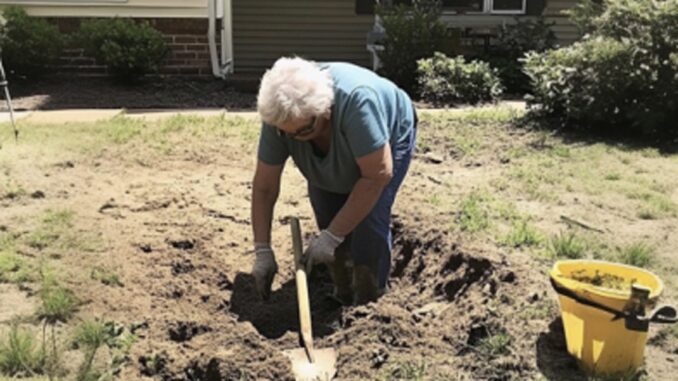
It was an ordinary day bathed in golden sunlight when life decided to surprise me. I was folding laundry by the window, savoring the tranquility of my street, when I noticed Mrs. Cartwright, my 67-year-old neighbor, in her yard.
Petite and always dressed impeccably in neat cardigans, Mrs. Cartwright carried an aura of kindness despite her frail health. Yet today, her usual calm was replaced by frantic energy as she attacked the earth with a spade, sweat soaking her blouse. Something wasn’t right.
I opened my window, concern edging my voice. “Mrs. Cartwright! Are you alright?”
She didn’t respond, her movements feverish and desperate. Uneasy, I called out again, louder. “Do you need help?”
No answer.
I was about to retreat when she suddenly dropped the spade, raised her trembling hands to the sky, and cried, “Finally!” Then, as if the effort had drained her entirely, she collapsed beside the hole she’d dug.
“Mrs. Cartwright!” My heart leapt into my throat as I raced out the door and into her yard.
Her frail body lay still by the freshly dug earth, one hand resting on the edge of the hole. I knelt beside her, gently shaking her shoulder. No response. I checked her pulse—faint but present—and sighed in relief at the shallow rise and fall of her chest.
But as I adjusted her for better airflow, something caught my eye. In the hole, a corner of weathered wood protruded from the soil—a small, wooden box.
I hesitated, torn between my neighbor and the strange object she’d unearthed. Curiosity won. I reached into the dirt and pulled out the box. Its lid creaked open to reveal bundles of letters tied with faded twine, yellowed photographs, and a sealed envelope.
Before I could process what I was holding, a soft groan pulled my attention.
“Mrs. Cartwright?” I whispered, leaning closer as her eyelids fluttered open.
Her gaze found the box, and she gasped, reaching out with surprising strength. “Is it…?”
“It’s here,” I assured her. “But you need to rest.”
Ignoring my protests, she cradled the box, tears streaming down her weathered cheeks. “Sixty years,” she whispered.
“Sixty years?” I echoed, confused.
Her voice trembled as she explained. “My husband buried this before going to war. He said it held his dreams—everything he wanted for us. He told me to find it if… if he didn’t come back.”
Leave a Reply